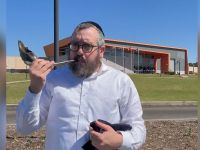What makes you, you? Is it the country you were born in or the family you come from? Is it the university you went to? The experiences you have? At TEDxAUB, they call this raw outline, “Blueprints.” A synergy of idiosyncratic pieces – some more jagged than others – that makes us unique. It was a full house Saturday morning. Eight speakers – Stéphane Bazan, Elbert Ahmad Giron, Diala Ahwash, Lynn Zovighian, Tarik Shehayeb, Tala Amhaz, Mounir Camel-Toueg and Georges Sassine – were patiently waiting in the front row as 280 attendees trickled in the Charles W. Hostler Student Center.
A little after the lights were dimmed, attendees were urged not to check their phones during the talks.
Lynn Zovighian, who wasn’t scheduled until after the first social space, told The Daily Star beforehand that she was excited to know what’s going to happen after the TEDx talks. “What are we going to do with all of these ideas? We need to move away from a culture of talking to a culture of action and think that this will serve as the catalyst for that.”
No stranger to the online TEDx Talks, Zovighian elaborated: “When done right, they provoke an intellectual curiosity. This stage is not about figuring out all the answers, it’s about putting certain arguments to the test and helping the public take ownership of them.”
On an individual level, the raw, emotional appeal of sitting in a darkened room as a speaker reels you into a crescendo of well-crafted storytelling is contagious. There’s beauty in watching the story unfold before your eyes instead of reading or viewing it online.
To date, there have been 16,500 TEDx Talks in 1,200 cities in 177 countries. TEDx Talks, which are essentially do-it-yourself TED conferences produced by volunteers, require licenses. Although the TEDxAUB initiative obtained one three years ago, Yasmine Hajjar, managing editor of AUB Press and this year’s TEDxAUB licensee, traveled to California to participate in workshops to expand the initiative.
This year, TEDxAUB registered as an official club with more than 140 members and 22 student organizers.
“We wanted to create a platform that allows students to see what other people are working on, to get them to see that we have ideas that have been built and not be boxed in with the general mainstream,” Hajjar explained. “You have a lot of people that built companies from scratch, or initiatives or even just have something to say that can guide people.”
“Unlike the first TEDxAUB, this one was organized A-Z by the students. For example, the students held the auditions and trained the speakers,” she added.
The impact Hajjar hopes to achieve with TEDxAUB is simple. “When you leave this auditorium, leave with a different way of thinking, with a new idea, be open to trying to break out of the box, and that would be more than enough for me.”
Listen to any TEDx Talk and you’re bound to experience an intellectual adrenaline rush triggered by the thrill of imagination, the possibility of inspiring change. Yet the appeal of TED comes as much from its presentation as from its substance.
Bazan, head of research and consulting at Keeward, spoke of web science – a discipline that focuses on understanding and possibly re-engineering the mechanisms of the web to limit its dangers – cybercrime, information warfare, brainwashing – and protect the individuals using it.
AUB political studies student Ahmad Giron related his African American-Latino roots – a self-proclaimed “unemployed thug stealing jobs from Americans” – to his study of the polarization of Syrian nationals in Lebanon.
Ahwash, “Bent El Hamra,” recounted her experiences traveling across Lebanon’s rural areas to put her political science studies into perspective. Zovighian gave a refreshingly realistic talk about tackling the brain drain that has pressured over 600,000 young Lebanese to emigrate since 1990 in search of more successful opportunities.
Shehayeb, founder of the Lebanese-Flamenco band Rojo Del Libano, addressed the conversation of sickness in a moving speech that delineated his diagnosis with MS (multiple sclerosis), or as he called her, Maria Salina.
Amhaz encouraged people – even the fiery ones – to be kind and compassionate, while Camel-Toueg, a PR expert extraordinaire, navigated the audience through social media applications of the digital era.
Sassine, co-founder of the NGO Lebanese Oil and Gas Initiative, discussed Lebanon’s oil and gas industry and what happens when a country becomes oil rich.
“I think the energy and spirit of TEDxAUB is wonderful. It’s something that Lebanon and the region needs,” Hrag Vosgerichian told The Daily Star. “Some lessons I learned are to just be empathetic because I think that was a transcendent theme in the talks: Empathetic toward others and empathetic toward yourself. I want to comment that in the midst of everything happening in Lebanon and Paris, I think we need such events to ground us and start cultivating this culture of citizenship, trust and cooperativeness,” he added.
Ghazal Ali, one of volunteers, said that: “From my experience, I feel what’s behind the scenes is actually more interesting than what happens on stage because what you see on stage is amazing speakers who have everything together. But when you see them in rehearsal you realize like they are just like us; they get frightened on stage, they have issues, but it’s how they choose to overcome them that’s inspiring.”
Aside from the talks, there was a social space set up for attendees and speakers to mingle, and two performances – fusion band Moukafahet al-Geedz and rapper Hani al-Sawah – scheduled throughout the presentations.
For more information about TEDxAUB and the speakers, visit their website www.tedxaub.com.
By Talia Abbas








